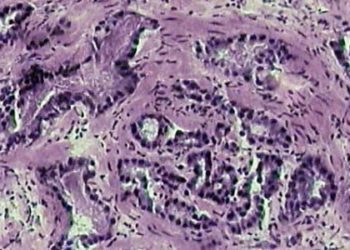Ischemic heart disease increases linearly with radiotherapy for breast cancer
[tabs tab1=”2MM Rundown” tab2= “2MM Full Report”]
[tab]
Image: PD
1. The risk of a major coronary event in women treated with radiotherapy for breast cancer increases linearly with the mean dose of radiation to the heart at 7.4% per gray, with no apparent threshold below which there is no risk.
2. Women with ischemic heart disease risk factors, such as diabetes and smoking, are more vulnerable to radiation-related cardiac damage than women without cardiac risk factors.
Published today in NEJM, this study quantifies the risk of ischemic heart disease as a result of collateral radiation exposure to the heart through radiation therapy in breast cancer. The authors showed a linear relationship between radiation exposure and rate of IHD with 7.4% rate increase per one Gray, with no minimum threshold for risk. Rates of major coronary events were higher in women with preexisting IHD and also in women with one or more IHD risk factors. Note that this is a case-control study and one cannot infer causation. Importantly, this study indicates that it is possible to estimate a woman’s absolute risk of radiation-related IHD. This information would be useful for patients and clinicians when weighing the probable absolute risk reductions of breast cancer recurrence and mortality that can be achieved with radiotherapy, against the long-term sequelae of this treatment modality. Further work looking at radiation load to specific anatomical areas of the heart may be helpful in stratifying risk.
Click to read the study in NEJM
[/tab]
[tab]
Image: PD
1. The risk of a major coronary event in women treated with radiotherapy for breast cancer increases linearly with the mean dose of radiation to the heart at 7.4% per gray, with no apparent threshold below which there is no risk.
2. Women with ischemic heart disease risk factors, such as diabetes and smoking, are more vulnerable to radiation-related cardiac damage than women without cardiac risk factors.
This [case control] study of Swedish and Danish women compared radiation doses for the treatment of breast cancer in 963 women with major adverse cardiac events versus 1205 controls without any major events. Cases and controls were matched for age and year at breast cancer diagnosis. Patients with recurrent disease, other cancer diagnoses and major coronary events prior to breast cancer diagnosis were excluded. The authors used virtual simulation to estimate the radiation doses to each patient’s heart. The overall average of estimated mean doses of radiation to the heart was 6.6 Gy and 2.9 Gy for left and right tumors, respectively. Radiation to the left breast was associated with a higher rate of major events. The rate of major events increased 7.4% for each 1 gray increase in radiation. The risk ratio of major events was significantly higher in women with preexisting ischemic heart disease with IHD risk factors. Most events occurred within 10 years of treatment.
In sum: Published today, this study quantifies the risk of ischemic heart disease as a result of collateral radiation exposure to the heart through radiation therapy in breast cancer. The authors showed a linear relationship between radiation exposure and rate of IHD with 7.4% rate increase per one Gray, with no minimum threshold for risk. Rates of major coronary events were higher in women with preexisting IHD and also in women with one or more IHD risk factors. Importantly, this study indicates that it is possible to estimate a woman’s absolute risk of radiation-related IHD. This information would be useful for patients and clinicians when weighing the probable absolute risk reductions of breast cancer recurrence and mortality that can be achieved with radiotherapy, against the long-term sequelae of this treatment modality. Further work looking at radiation load to specific anatomical areas of the heart may be helpful in stratifying risk.
Click to read the study in NEJM
By Jessica Mitchell and Mitalee Patil
© 2013 2minutemedicine.com. All rights reserved. No works may be reproduced without written consent from 2minutemedicine.com. Disclaimer: We present factual information directly from peer reviewed medical journals. No post should be construed as medical advice and is not intended as such by the authors or by 2minutemedicine.com. PLEASE SEE A HEALTHCARE PROVIDER IN YOUR AREA IF YOU SEEK MEDICAL ADVICE OF ANY SORT. Content is produced in accordance with fair use copyrights solely and strictly for the purpose of teaching, news and criticism. No benefit, monetary or otherwise, is realized by any participants or the owner of this domain.
[/tab]
[/tabs]







